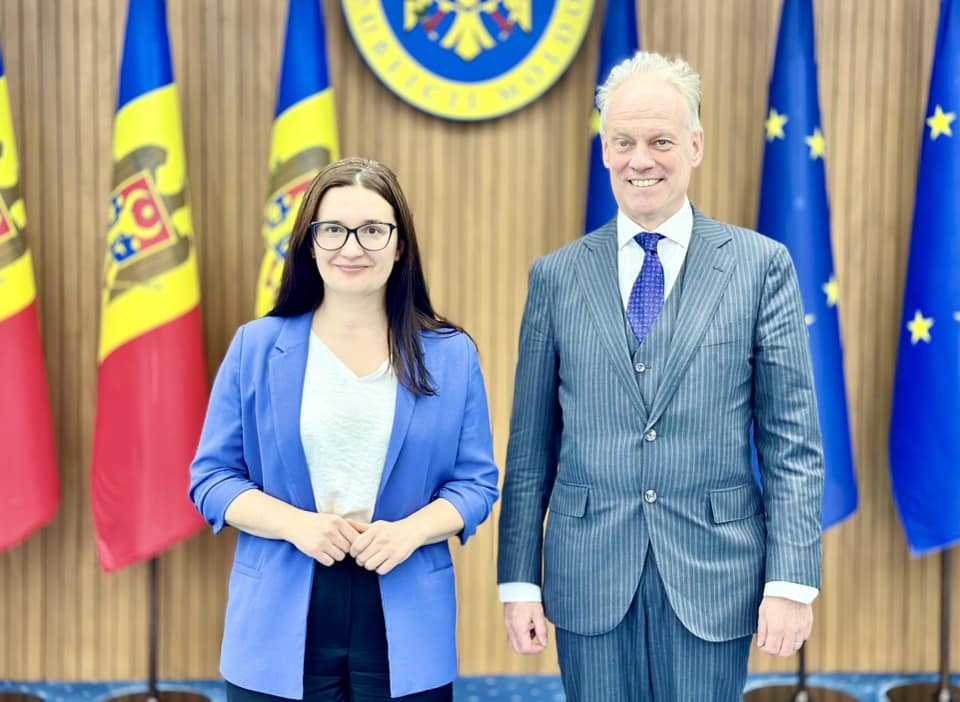
Moldovan deputy PM says leadership manages to speed up approval of Growth Plan for Moldova
The approval of the Growth Plan for Moldova, which includes a financial support package worth 1.9 billion euros, by the European Commission and the European Parliament is a success of the cooperation between EU and Moldova. Deputy Prime Minister for European Integration Cristina Gherasimov has received Gert Jan Koopman, Director General of the Directorate-General for Neighbourhood and Enlargement Negotiations of the European Commission, who negotiated the expedited approval deadlines for the country.
In Chisinau, Gert Jan Koopman discussed with teams from public institutions, hich prepare Moldova for accession to the European Union.
’’Together, we discussed the progress made in the last three years and the next steps on the European agenda. The fact that we managed to speed up the approval of the Growth Plan for Moldova is largely due to Gert Jan Koopman's team, who negotiated tight terms for the decision-making process at Brussels institutions,’’ said Gherasimov.
Deputy Prime Minister Cristina Gherasimov thanked the European Commission for appreciating the efforts made by the Moldovan authorities on their path to the EU.
The European Parliament on March 11 approved the 1.9 billion euro support package for Moldova. This represents the largest financial aid provided by the EU to the country.
European Commissioner for Enlargement, Marta Kos, praised the efforts of Moldova on the path to European integration, noting that the decision to approve the financial support package represented a strong vote of confidence in the country's European future.
The EU assistance will strengthen the resilience of Moldova against hybrid attacks and Russia's interference, targeting its democratic processes and institutions. The support package includes 520 million euros in grants and 1.5 billion euros in low-interest loans. The facility also provides for pre-financing of 18 per cent of the total support, up from the initially proposed 7 per cent, which will allow the quick mobilization of resources to ensure energy security, fight corruption more efficiently and modernize public services.
Deputy Prime Minister on visit to Brussels
Moldova's EU accession negotiations progress quickly
Moldovan deputy PM says European funds to be invested in infrastructure projects, to improve citizens' lives
European Parliament to open liaison office in Chisinau
EuroQuiz 2025 // Moldovan students challenged to test knowledge about European Union
Moldova not alone in 'uncertain security context'
EU experts to visit Chișinău to assess how national authorities managed corruption cases
Denmark supports Moldova's European path
Moldovan deputy PM for European integration has discussions with European Parliament's delegation
Integration of Moldovan financial system into European Space: Banks of Moldova submit first applications for joining SEPA
Weather forecast in Moldova for 19-20 April
VIDEO // Famine of 1946-1947: Tragedy seen through eyes of the then children
Works of construction of Vulcanesti - Chisinau power line advance over distance of 100 km, with more than 300 pylon foundations completed
Moldovan carabineers go on peacekeeping mission in Kosovo
Construction of bridge at Ungheni over Prut river to be launched on 26 April through special event
PHOTO GALLERY // Central market crowded with shoppers in run-up to Easter
Over 400 firefighters to be on duty in Moldova on Easter Night
Increased passenger traffic at Chisinau Airport during Easter holidays
Electoral campaign for new local elections starts today
500 million lei for local road construction
Fuel prices continue to drop in Moldova
First candidates registered for electoral race in new local elections on 18 May
Police to boost measures to prevent traffic violations during holidays
President: Our commitment - to finalize EU accession negotiations by late 2027
National Bank of Moldova puts into circulation new commemorative coin


